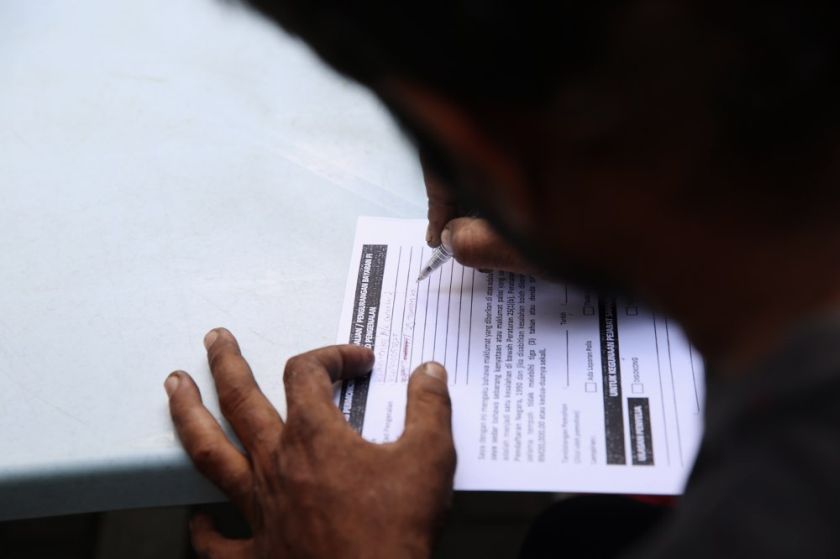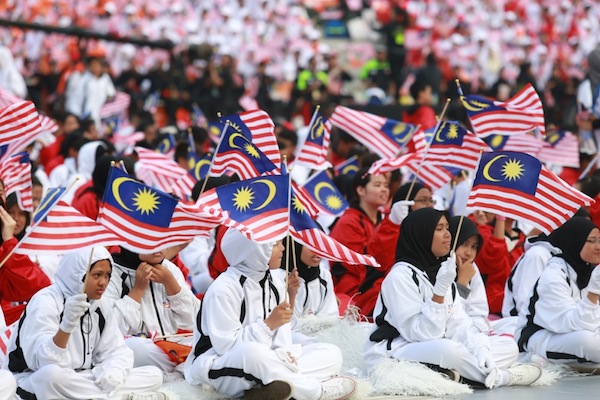KUALA LUMPUR, Feb 26 — The Federal Court is scheduled to hear today the joint appeal of four Sarawakians who want to know if it is the civil or the state Shariah courts which can decide on their bid to convert out of Islam.
The hearing is part of the many years of waiting by the four who just want their identity card and official records to reflect the fact that they are now practising Christians.
Conversion for marriage
Three of the Sarawakians affected were initially non-Muslims who converted to Islam to marry, but have since returned to Christianity.
In multiracial and multireligious Malaysia, intermarriage is not unheard of, but those who want their marriage to Muslims recognised under local laws are required to convert to Islam.
Sarawak’s Islamic Family Ordinance 2001 — which applies to all Muslims in the state — deals with void marriages under Section 9(1) and bluntly states: “No person shall marry a non-Muslim.”
In the case of Jenny binti Peter @ Nur Muzdhalifah Abdullah who is of Melanau ethnicity, her parents were Christians and she was raised as one. She converted to Islam in 2002 to marry a Muslim man, but returned to the religion of her birth after her divorce in 2006.
Salina Jau binti Abdullah who is of Kayan/Kenyah ethnicity too became a Muslim in early November 1992 before marrying a Muslim man the same month. She decided to return to Christianity after divorcing in 2010.
Mohd Shafiq Abdullah, born Tiong Choo Ting and who is of Chinese-Bidayuh heritage converted to Islam in 1996 to marry a Muslim woman. He returned to Christianity after his wife died in 2007.
Despite the fact that the three are currently living as non-Muslims, they have not been able to get the government’s recognition of the change in their religious status.
All three have taken efforts to follow the law, including signing statutory declarations or sworn statements to declare that they wish to renounce Islam and by informing the Sarawak Islamic Religious Department (JAIS) of their intention to do so.
The three had even completed the counselling sessions that JAIS asked them to attend as part of the process to renounce Islam, deciding after counselling to leave Islam.
The Department of Syariah Judiciary Malaysia (JKSM) had in 2014 told Malay Mail that the process of leaving Islam includes counselling sessions where a reconciliation committee will persuade a person to repent and remain as a Muslim.
According to the Court of Appeal judgment in their cases, Jenny was told after counselling that she could leave Islam but did not receive the report from JAIS that would allow her to officially do so, while Salina Jau was also told she had completed all that was required by JAIS to leave Islam. Mohd Syafiq was denied by JAIS a certificate of completion of counselling despite attending as requested.
With no response from JAIS to their written requests for a Letter of Release from Islam, the three each filed in 2015 a lawsuit in the civil courts against the JAIS director, the Majlis Agama Islam, the National Registration Department (NRD) director-general and the state government.
They are seeking a declaration that they are Christians; an order to compel the Sarawak Islamic authorities to issue a letter of release from Islam and an order to compel the NRD to drop the word “Islam” from their identity cards and records and amend their religious particulars at the national registry to Christianity.
.jpg)
Sarawakian who converted out of Islam
Unlike the earlier trio, Syarifah Nooraffyzza Wan Hosen had converted to Christianity in October 2009 despite being born a Malay to parents who are Muslims. On July 26, 2011, the Sarawakian applied for a name change in her identity card, according to the Court of Appeal judgment in her case.
The NRD had then written to tell her that she had to first get a letter of release from Islam from the JAIS director’s office, which she did in August 3, 2011 but did not get a response then.
In July 2012, she was told during a visit to the JAIS director’s office that she had to go to the Shariah court and attend counselling sessions as part of the process to renounce Islam. But the sessions did not take place and her lawyer’s bid to get a list of the conditions for renouncing Islam was not successful.
Syarifah Nooraffyzza then filed in 2014 a lawsuit in the civil courts against the same four respondents, seeking similar reliefs as well as a court order to compel the NRD director-general to change her name to Vanessa Elizabeth.

Legal roadblocks
Despite their efforts, all four Sarawakians have faced setbacks in the civil courts to date.
On January 5, 2015, the High Court dismissed Syarifah Nooraffyzza’s application for leave to have her lawsuit heard. The same court also similarly refused the leave applications filed by the trio respectively on September 21, 2015.
The Court of Appeal on April 19, 2016 and August 17, 2016 dismissed Syarifah Nooraffyzza’s appeal and the trio’s appeals against the High Court rulings. Without the court’s leave, the four’s lawsuits where they are seeking to be officially recognised as non-Muslims cannot be heard.
At both the High Court and Court of Appeal, the presiding judges ruled that it is the Shariah courts that have the jurisdiction to decide on apostasy cases and not the civil courts.
‘Deadlock’
This is despite the Sarawak Shariah Court saying in a March 10, 2015 letter that none of the state laws empower it to deal with declarations of leaving Islam as required by the NRD, with the letter further concluding that it therefore did not have the jurisdiction to issue the Letter of Release from Islam.
The Court of Appeal had acknowledged the “deadlock” that the three Sarawakians were placed in with the Sarawak Shariah court’s letter, but said it was bound by Federal Court decisions that it is for the Shariah courts to decide on whether someone is a Muslim or not. It suggested that the solution to the trio’s predicament may lie in the Sarawak state legislature.
The Court of Appeal in Syarifah Nooraffyzza’s case had also cited a similar reasoning of being bound by several Federal Court rulings.
However, lawyers for the Sarawakians had argued in court that the civil High Court has the jurisdiction to hear these apostasy cases as the Sarawak Shariah court does not have the power to decide on these cases.
The Sarawakians’ lawyers also argued that Sarawak’s Syariah Courts Ordinance 2001 — under which the state’s Shariah courts are formed and their jurisdiction are outlined—does not provide for such apostasy issues to be dealt by the Shariah courts.
 What today’s hearing is about
What today’s hearing is about
The four Sarawakians subsequently filed for leave to appeal against the Court of Appeal’s decision, and the Federal Court granted them leave on February 9, 2017 to hear their appeal.
So today, the Federal Court sitting in Kuching will hear arguments from both the four Sarawakians’ lawyers — including Baru Bian — and government lawyers on a question of law: whether it could be implied in the Syariah Courts Ordinance 2001 that the Sarawak Shariah courts have the power to decide on cases involving conversion out of Islam, even when this state law has no such provisions relating to conversion out of Islam.
Today’s hearing is not on whether the four can get the court orders that they sought for — including the declaration that they are Christians, but whether their lawsuits can be heard at the civil courts at all.

Why is this important?
Lawyer Simon Siah, whose law firm will be holding a watching brief for the Sarawak Dayak Iban Association and The Methodist Church in Malaysia in today’s appeal hearing, pointed out that Sarawak was previously promised religious freedom.
“When our forefathers agreed to come together with Malaya, Sabah and Singapore to form Malaysia, we were promised complete freedom of religion throughout Sarawak but such freedom has slowly been taken away by the State Government.
“The hearing of these four Federal Court cases showcase that Sarawakians now have to go to court to get back these rights that we have enjoyed over the century. We urge the state government to honour the wills of our forefathers when Malaysia was formed,” he told Malay Mail when contacted.
For a quick recap on the pathway to officially be recognised as having left Islam in Malaysia, read this Malay Mail report in 2014: “Path to leave Islam simple, but far from easy“.
Below is an infographic as of 2014 on the pathway to leave Islam in Malaysia:




















